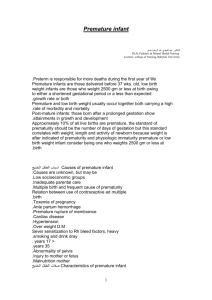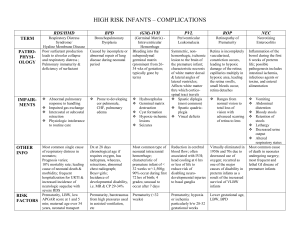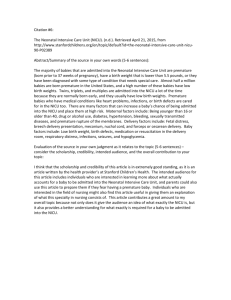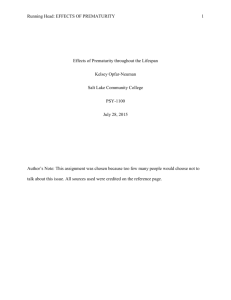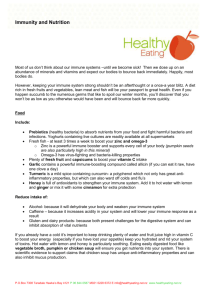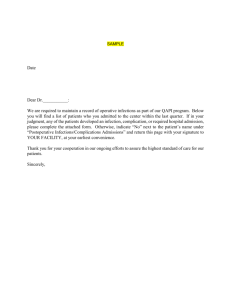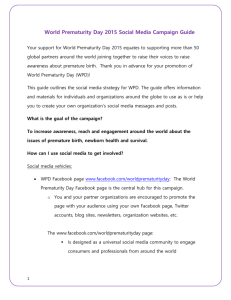Preventing Prematurity
advertisement
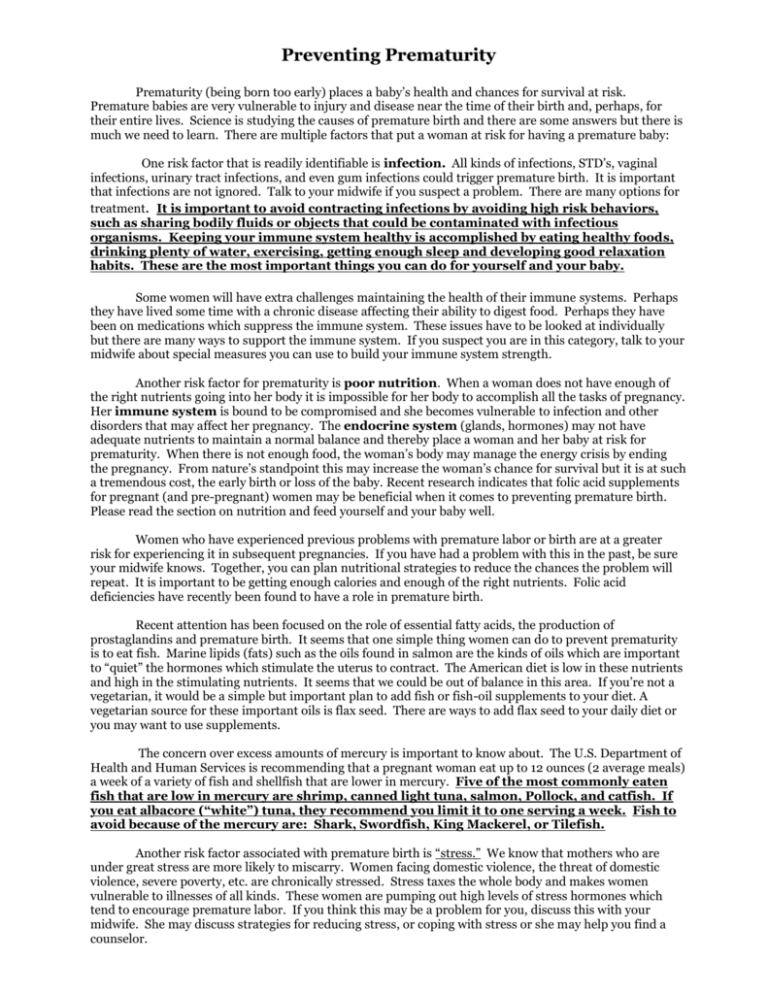
Preventing Prematurity Prematurity (being born too early) places a baby’s health and chances for survival at risk. Premature babies are very vulnerable to injury and disease near the time of their birth and, perhaps, for their entire lives. Science is studying the causes of premature birth and there are some answers but there is much we need to learn. There are multiple factors that put a woman at risk for having a premature baby: One risk factor that is readily identifiable is infection. All kinds of infections, STD’s, vaginal infections, urinary tract infections, and even gum infections could trigger premature birth. It is important that infections are not ignored. Talk to your midwife if you suspect a problem. There are many options for treatment. It is important to avoid contracting infections by avoiding high risk behaviors, such as sharing bodily fluids or objects that could be contaminated with infectious organisms. Keeping your immune system healthy is accomplished by eating healthy foods, drinking plenty of water, exercising, getting enough sleep and developing good relaxation habits. These are the most important things you can do for yourself and your baby. Some women will have extra challenges maintaining the health of their immune systems. Perhaps they have lived some time with a chronic disease affecting their ability to digest food. Perhaps they have been on medications which suppress the immune system. These issues have to be looked at individually but there are many ways to support the immune system. If you suspect you are in this category, talk to your midwife about special measures you can use to build your immune system strength. Another risk factor for prematurity is poor nutrition. When a woman does not have enough of the right nutrients going into her body it is impossible for her body to accomplish all the tasks of pregnancy. Her immune system is bound to be compromised and she becomes vulnerable to infection and other disorders that may affect her pregnancy. The endocrine system (glands, hormones) may not have adequate nutrients to maintain a normal balance and thereby place a woman and her baby at risk for prematurity. When there is not enough food, the woman’s body may manage the energy crisis by ending the pregnancy. From nature’s standpoint this may increase the woman’s chance for survival but it is at such a tremendous cost, the early birth or loss of the baby. Recent research indicates that folic acid supplements for pregnant (and pre-pregnant) women may be beneficial when it comes to preventing premature birth. Please read the section on nutrition and feed yourself and your baby well. Women who have experienced previous problems with premature labor or birth are at a greater risk for experiencing it in subsequent pregnancies. If you have had a problem with this in the past, be sure your midwife knows. Together, you can plan nutritional strategies to reduce the chances the problem will repeat. It is important to be getting enough calories and enough of the right nutrients. Folic acid deficiencies have recently been found to have a role in premature birth. Recent attention has been focused on the role of essential fatty acids, the production of prostaglandins and premature birth. It seems that one simple thing women can do to prevent prematurity is to eat fish. Marine lipids (fats) such as the oils found in salmon are the kinds of oils which are important to “quiet” the hormones which stimulate the uterus to contract. The American diet is low in these nutrients and high in the stimulating nutrients. It seems that we could be out of balance in this area. If you’re not a vegetarian, it would be a simple but important plan to add fish or fish-oil supplements to your diet. A vegetarian source for these important oils is flax seed. There are ways to add flax seed to your daily diet or you may want to use supplements. The concern over excess amounts of mercury is important to know about. The U.S. Department of Health and Human Services is recommending that a pregnant woman eat up to 12 ounces (2 average meals) a week of a variety of fish and shellfish that are lower in mercury. Five of the most commonly eaten fish that are low in mercury are shrimp, canned light tuna, salmon, Pollock, and catfish. If you eat albacore (“white”) tuna, they recommend you limit it to one serving a week. Fish to avoid because of the mercury are: Shark, Swordfish, King Mackerel, or Tilefish. Another risk factor associated with premature birth is “stress.” We know that mothers who are under great stress are more likely to miscarry. Women facing domestic violence, the threat of domestic violence, severe poverty, etc. are chronically stressed. Stress taxes the whole body and makes women vulnerable to illnesses of all kinds. These women are pumping out high levels of stress hormones which tend to encourage premature labor. If you think this may be a problem for you, discuss this with your midwife. She may discuss strategies for reducing stress, or coping with stress or she may help you find a counselor.

